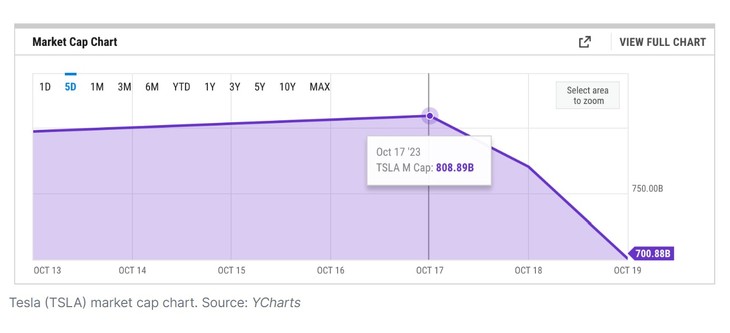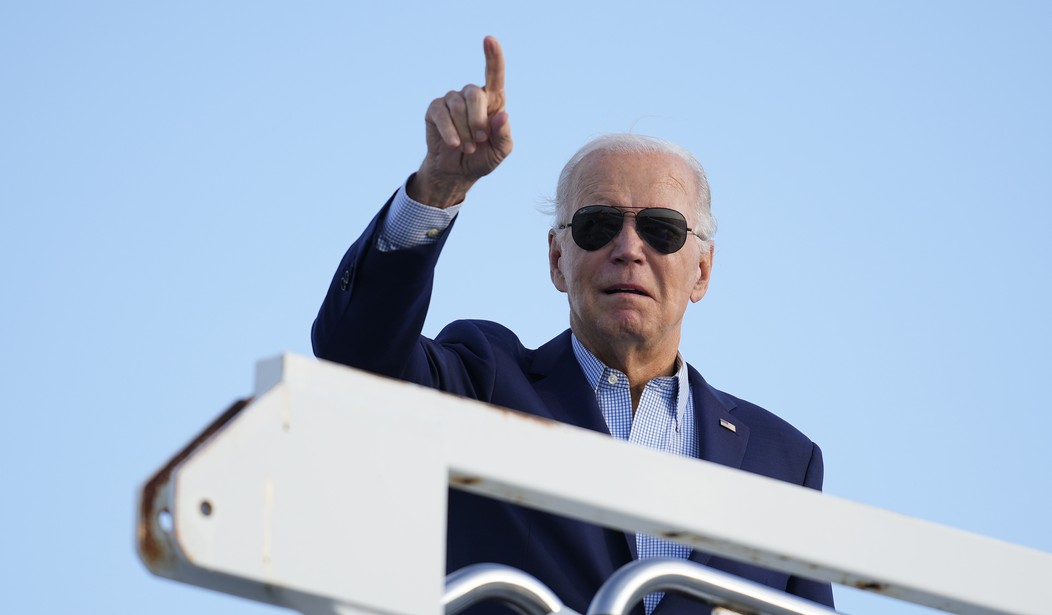So…um…OUCH.
$100 billion of market cap gone in one day! $tsla pic.twitter.com/bDUplrsxL0
— Josh Young (@Josh_Young_1) October 19, 2023
Tesla had their third quarter earnings call last night and it was a tough one all-around.

It sure seems as if Elon’s feeling the pain we all are. Kind of oddly comforting that the “disconnect” which is so confusing to the geniuses ruining the country seems to be affecting a true genius and his company as well, in a “So we’re NOT crazy” affirmational way.
Tesla CEO Elon Musk sounds pessimistic note about economy on earnings call
Not a strong headline sentiment there.
Tesla’s margins were down significantly – in large part thanks to the price cuts Elon’s been instituting on his more popular models. He’s hoping to entice car buyers who might be willing to consider an EV to now put a more affordable Tesla on their radar. Widening their customer base, as it were.
Whatever his motives, the market is a harsh taskmistress, and the profit slide didn’t sit well with analysts and Wall Street in aftermarket trading.
Tesla stock was dropping after weak earnings and downbeat comments from CEO Elon Musk. Wall Street wasn’t feeling very bullish after the report.
Tesla on Wednesday reported adjusted earnings per share of 66 cents and automotive gross profit margins excluding regulatory credit sales of 16.3%. Wall Street was looking for profit of 70 cents and margins of about 17.5%. Operating profit margins came in at 7.6%, down almost 10 percentage points year over year.
Price cuts were responsible for the decline in profitability. The economy is simply making it harder to sell cars, something Musk mentioned several times on the earnings conference call. “I am worried about the high interest rate environment that we are in,” he said. “I can’t emphasize this enough … the vast majority of people buying a car is about the monthly payment.”
After earnings, Tesla shares weren’t getting much help from analysts.
“No more rose-colored glasses,” wrote Wells Fargo analyst Colin Langan in a research report, adding the outlook for volume growth is unclear and profit margin pressures continue. “Not only was the Cybertruck ramp tempered, but Tesla is waiting on macro [economic improvement] before going full tilt on the Mexico plant,” he added. (Tesla is building its next assembly plant in Mexico).
It turns out that cyber truck is a yuge problem, conceptually and physically.
…Musk says he has driven the Cybertruck and “it is an amazing product.” But “there will be enormous challenges in reaching volume production with the Cybertruck and in making the Cybertruck cash-flow positive.”
The Texas plant has the capacity to make 125,000 trucks a year, and Musk insists there are 1 million people who have reserved one, but those numbers don’t mean Tesla will ramp things up quickly, as the truck is so difficult to make and get right, as leaked documents detailed this summer.
…Making prototypes—which is what Tesla has been doing with the truck for years now—is easy, Musk says. Making the production version for sale to customers is “10,000 percent harder,” he insists, because the truck is so “radical” and “special.” Those are polite ways of saying stainless steel is hard to work with, and flat expanses of bodywork are unforgiving when it comes to gaps, fit, and finish.
…Economies of scale won’t help bring down cost for a while. The CEO still thinks Tesla will eventually build 250,000 Cybertrucks a year, but said it won’t reach that production rate until sometime in 2025 at the earliest. At that point, it could generate cash flow for the company. Even so, it’s a timeline Musk called his best guess; roughly two years ago, he said volume production would start in 2024. In the meantime, work on the prototypes continues to be costly—with those costs climbing.
…“We dug our own grave with Cybertruck,” Musk told investors
…calling it the type of special product with lots of bells and whistles that only comes along once in a while.
What I found most interesting about the call was Elon’s tone about the state of the economy – everything’s not alright, and you can hear it clearly in what he says. Yeah, billionaire and all that, with analyst argle-bargle in some of it, but it boils down to “Are we in a situation going forward where people can continue to afford to buy our cars?” The answer – to Elon’s mind – is quite clearly “No.” While he is doing what is within his power to effect change for his company to deal with and survive the effects, what does that say about where we actually are and what’s being done about it?
I have zero warm #Bidenomics fuzzies…
…He said: “I’m worried about the high interest rate environment we’re in,” and said people buying cars are focused on how much their monthly payments will be. “If interest rates remain high or if they go even higher, it’s that much harder for people to buy the car.”
Musk later noted: “I just can’t emphasize enough how important cost is. …. We have to make our products more affordable so people can buy it.” He said that bringing the cost of Tesla’s cars down was akin to a ”‘Game of Thrones,’ but pennies.”
…Musk also noted that many shareholders want Tesla to advertise, and Tesla is currently advertising. (The company is at least paying for cost-per-click ads online, which have been reviewed by CNBC.) But if Tesla ads provide people with information about great cars that they cannot afford, that “doesn’t really help,” Musk said.
…Toward the end of the call, Musk apologized for sounding “paranoid,” about the economy which he said may be rocked by ongoing wars around the world (alluding to the conflicts underway between Israel and Hamas, and Russia and Ukraine). Likening Tesla to a world-class ship, he said, “Even a great ship in a storm has challenges.”
…but if Elon Musk can be “paranoid,” at least I know I’m…okay, WE’RE:
1) not crazy ourselves
2) in really good company
For example, this morning’s good news continued when they announced existing home sales dropped to their lowest reading since the Great Recession of 2010.
…This is the slowest sales pace since October 2010, during the Great Recession, when the market was in the midst of a foreclosure crisis. As a comparison, just two years ago, when mortgage rates hovered around 3%, home sales were running at a 6.6 million pace. The average rate on the 30-year fixed today is right around 8%, according to Mortgage News Daily.
And then there’s:
Don’t worry, it’s totally 100% normal for major newspapers to be running headlines like thishttps://t.co/effUoLjDaL
— Not the Bee (@Not_the_Bee) October 19, 2023
#Bidenomics – is there anything it can’t ruin?
A little paranoia is going to go a long way around these parts.








Join the conversation as a VIP Member